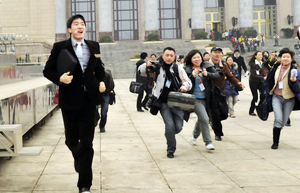China to adjust monetary policy on economic changes
(Xinhua)
Updated: 2010-03-06 11:23
BEIJING - China will adjust its monetary policy in accordance with changes of economic indicators and feedbacks from policy implementation, said central bank governor Zhou Xiaochuan Saturday.
Zhou made the remarks at a press conference on the sidelines of the annual session of the National People's Congress (NPC), the country's top legislature.
China targets a rise of consumer price of around 3 percent this year, according to the government work report delivered by Premier Wen Jiabao Friday.
"It's difficult for us to anticipate all the possible scenarios and changes in indicators. Therefore, our policy will be adjusted according to changes in economic indicators and feedbacks from implementation," said Zhou.
"We are going to continue with a moderately easy monetary policy but at the same time closely follow inflation and changes in other economic indicators," he said, noting that inflation control will be very complicated this year.
China will face the issue of withdrawing its economic stimulus package sooner or later, but "the timing of the exit must be treated with great caution", he said.
The country has shifted its monetary policy from "tight" to "moderately easy", together with a four-trillion-yuan ($585 billion) stimulus package in late 2008 to help the national economy ride out the global slowdown.
China will enhance the focus and flexibility of the policy according to new conditions and strike a balance between inflation expectation management and maintaining a sound growth, he said.
In response to a question about the issue of yuan exchange rate, Zhou said China's foreign exchange rate forming mechanism is a choice made in the light of concepts and rules of the International Monetary Fund and the country's own conditions.
It is understandable that countries hold different stances on the issue of exchange rate policies, which could spark accusations, he said, but China opposes politicizing exchange rate issues.
"We oppose to such moves, which can not help solve problems," Zhou said.
He also indicated concerns about China's holding of US dollar assets. "The US dollar is still a key currency in the world, and China will closely monitor the trend of US dollar against other currencies."





